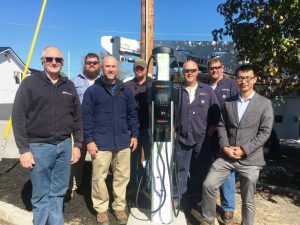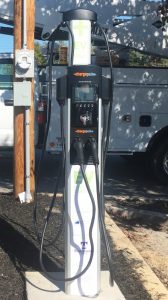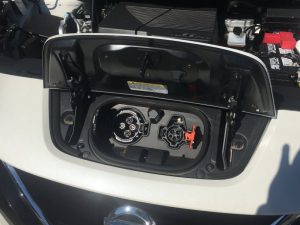November 2, 2020
By: Dwayne Page
Imagine owning an automobile that you don’t fill up, but charge up.
Smithville’s first ever electric vehicle charging station was installed Monday located at the city parking lot across from Love-Cantrell Funeral Home.
Lead project infrastructure partner Seven States Power Corporation managed the installation in cooperation with Smithville Electric System and Tennessee Tech University.
Plans are to install a total of nine such electric car stations throughout the Upper Cumberland Region. Cookeville, Lafayette, Carthage, Livingston, and Spencer already have one in addition to Smithville and Sparta, Jamestown, and Byrdstown are due to get one within days.
TTU Mechanical Engineer Assistant Professor Pingen Chen said the project is part of a three-year Tennessee Tech study to research how electric vehicles could be the new future of transportation in rural communities. “Electric vehicles can bring a lot of benefits over conventional automobiles including the low fuel cost and low operational cost”.
This project is one of the first of its kind. Chen said this is an important study because 97 percent of the United States consists of rural areas but contains 20 percent of the population. He said the main drawbacks why electric vehicles have not become more practical is due to a lack of knowledge, awareness, and charging station availability.
Brad Rains, Director of DER Deployments with the Chattanooga based Seven States Power Corporation, expects EV drivers to embrace the charging station’s convenience. “Most EV drivers will charge the battery overnight at home,” said Rains. “This station is used for getting a little bit of power over a shorter period. Every hour you charge at the Chargepoint, you’ll add 25 to 30 miles of range to your car. It’s like topping off your tank.”
Eight of the charging stations in the Upper Cumberland Region, including the one in Smithville, are Level 2.
“This particular charger is a 7 kilowatt charger so that means you get 7 kilowatt hours each hour you use it and how long it takes to recharge depends on the size of the battery in your car and how empty or full that battery is. For example, if you have a 60 kilowatt hour battery and you are half way depleted that means you need 30 kilowatt hours so it will take you a little over 4 hours to put 30 kilowatt hours back into the vehicle,” Rains said.
“If you own an electric vehicle it has a display very similar to a gas gauge with which we are all familiar and it will tell you whether you are 75, 50, or 25 % full of charge. When you get down to that 25% in a gasoline fueled car you get a little nervous. You start looking for a gas station. The same thing applies with electricity. You’ll see that 25% mark on your gauge and you will know its time to refuel just like with your gas tank. If you have a 20 gallon gas tank and you are at 25% you need 15 gallons to fill up. The same thing with electricity. If your battery is 60 kilowatt hours at 25% you need 45 kilowatt hours”.
To activate the charge station, Rains said EV owners download the Chargepoint app and set up an account with their credit card on a mobile phone or computer. They scan the app at the station, and once the car is plugged into the machine, the cost is one dollar per hour and that money locally flows back to Smithville Electric System for those charges and revenues. While the vehicle is charging, EV drivers have time to spend downtown shopping or enjoying a meal at a restaurant.
Chen said after all stations are installed, three electric vehicles will be given to UCHRA to test transportation practicality: a Nissan Leaf, an EV pickup truck, and a EV shuttle bus.






